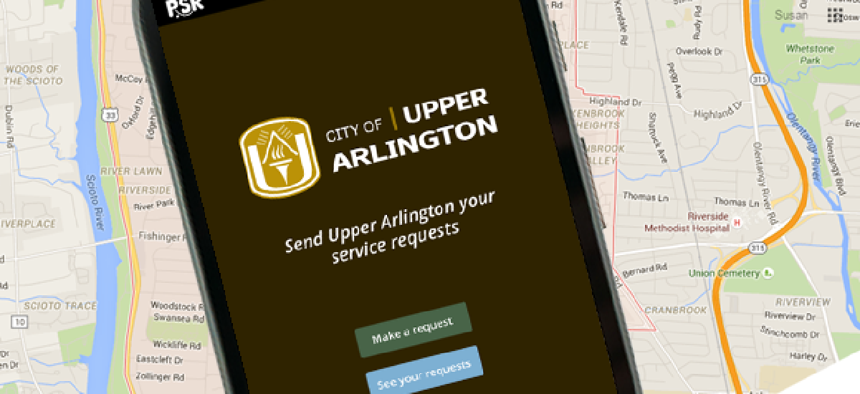311 app works across jurisdictions

Public Service Request’s mobile app lets users lodge complaints or submit service requests to local governments -- even as they move across municipalities.
A new mobile app lets users lodge complaints or submit service requests to local governments -- even as they move across municipalities.
The main feature of Public Service Request’s app, released March 30, is multijurisdiction functionality. It means that as people travel from city to city, county to county and state to state, they can use the same app to contact multiple government organizations -- as long as those governments are customers of PSR’s customer relationship management and work management system.
“If I’m in Madison, [Wis.], it knows I’m in Madison,” PSR Managing Partner Dave Robbins said. “If Madison wants it to be branded, then the app’s going to have Madison branding – whatever colors, their Madison logo or seal. … If I drive or I walk into [the city of] Fitchburg, that changes to Fitchburg. If I walk out of Fitchburg and I’m not in city limits and I’m in the county, it will change to the county.”
Here’s how it works: Once a government contracts with PSR, the company works with officials to list all the services the city, county or state offers and maps those services to the appropriate agency using a polygon of its boundaries. If the government contracts the service, such as trash pickup, out to a vendor, PSR can map trash pickup requests directly to the vendor. That means workers there will see the request without a government worker having to forward it along.
PSR relies on global positioning system technology and Google Maps to know where users are when they submit a request. After downloading the app for free, users can either approve or opt out of allowing it to follow their location. If their location is not tracked, users must enter addresses, or approximations thereof, of the problem they need resolved. When they type in an address, a Google map pops up with a pin that can be moved to zero in on the right location.
When the app opens it presents a menu of services to users who can choose a service without knowing the responsible department, Robbins said. “All you have to know as a citizen is ‘I have a question about my utility bill,’ ‘I have a question because my garbage didn’t get picked up,’ ‘I want to tell somebody about a sign that’s been knocked over,’ ‘I want to tell somebody about a pothole,’ ‘I want to apply for a marriage license,’ ‘I want to apply for a permit.’”
The welcome screen of the app gives users two choices: make a request or view news and information. The latter is an option for governments to provide links to their website and blogs, for instance. Choosing to make a request, users go to the next screen, where they can create a new request or look at previous ones. To make a new request, users must select the service and the location. They can also attach photos, videos or PDF documents and add more notes.
The only personal information PSR requires is an email address, which it does not share with the governments unless a form for a permit or license is involved in the request. In those cases, some contact information must be shared. Typically, though, the government notifies PSR of where it is in the process of responding to requests and PSR sends email updates to the users.
Cloud-based PSR started as a web app, which works much the same as the mobile version. Data is fully encrypted to protect privacy and enhance security. The entry price for a local government to participate starts at $400 per month, and is based on population size.
Additionally, PSR is fully hosted. “You don’t have to have anybody do any IT. We can get it up and running in a week,” Robbins said.
The town of Pelham in Ontario, Canada (also the company’s birthplace), was an early adopter of PSR, using both the web and mobile apps. But what is happening behind the scenes in the work management system is the real value, Mayor Dave Augustyn said. In the past two and a half years, PSR has helped officials respond to requests from the town’s 17,000 residents more efficiently.
The council gets monthly reports about the number and types of requests that have been opened and closed. “There’s ongoing monitoring” by the chief administrative officer and directors, Augustyn said. “The director of public works can look in her area and say, ‘OK, how’s Dave doing with the ones that are assigned to him? Oh, look, he’s slacking off so I’m going to talk to him about this.’”
PSR uses a traffic light rating system to show when requests are taking too long to answer, for instance.
Before PSR. department managers had Excel spreadsheets on their desktops, which made it nearly impossible for officials to track work progress, Augustyn said. “Now it’s all in one spot,” which allows directors to easily monitor activities.
PSR is not alone in partnering with governments on 311-type services through apps. Many 311 apps let users report issues, but they don’t all have multijurisdiction capability, Robbins said.
Editor’s note: This article was corrected April 29 to delete Mr. Robbins’ assertion that SeeClickFix and CitySourced do not offer multijurisdiction capabilities. A CitySourced representative clarified that CitySourced has long offered such functionality, and GCN confirmed that SeeClickFix does so as well.





